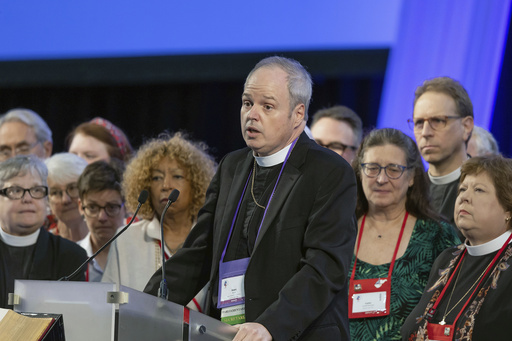
(RNS) — Sean Rowe, the newly appointed presiding bishop of the Episcopal Church, has firsthand knowledge of the realities of economic hardship.
As a child in Hermitage, Pennsylvania, he witnessed significant industrial changes, including the closure of the Westinghouse Electric Corp. plant. The subsequent bankruptcy of Sharon Steel resulted in mass layoffs, including those of his relatives.
Now at the age of 49, Rowe has been entrusted with the formidable task of implementing fiscal and organizational reforms within a denomination experiencing a decline in membership.
The Episcopal Church’s numbers fell just under 1.6 million in 2022, registering a 21% decline since 2013. Recent years have seen this downward trend accelerate, leading to alarming headlines about the church’s fate.
Rowe was elected on the first ballot during the search for a successor to Michael Curry, the first Black presiding bishop. He has previously served as the bishop of Northwestern Pennsylvania and temporarily led the Western New York diocese under a unique partnership model that is now being explored in other regions.
At the General Conference where Rowe was elected, he was charged with devising a strategy to save $3.5 million in staff costs over three years.
With a Ph.D. focused on organizational learning and leadership, Rowe has articulated a vision for streamlining the church’s hierarchical structure and reallocating resources to grassroots ministries.
His initial fortnight in office has been eventful, starting with the election of Donald Trump as president. In response, Rowe affirmed the church’s mission to advocate for justice, peace, and the dignity of all individuals.
He also faced the resignation of Archbishop Justin Welby, the spiritual leader of the global Anglican Communion, amid a scandal involving child sexual abuse. The Episcopal Church is one of 42 autonomous churches within this global body, which has approximately 80 million adherents worldwide.
Rowe expressed his devastation over the abuse crisis, asserting that “Abuse in any form is horrific and abhorrent,” and he committed to addressing any shortcomings regarding child protection in the Episcopal Church.
Residing in Erie, Pennsylvania, Rowe shares his life with his wife Carly, who serves as the executive director of the Cathedral of St. Paul, and their 12-year-old daughter, Lauren. In a recent interview with RNS, Rowe, marking his status as the youngest presiding bishop, discussed the challenges he faces ahead.
When addressing structural changes, Rowe emphasized that the church must evolve to fulfill its mission effectively. “We have to adapt to the contemporary world,” he stated, hoping to rejuvenate the church’s identity and improve its effectiveness.
He elaborated on his intent to reorganize the denominational structure to emphasize local ministries, stating that their perspective on the Kingdom of God diverges sharply from prevailing cultural narratives. He aims to render the church more relevant and agile in a changing landscape.
Rowe acknowledged the top-heavy nature of the church’s structure, saying it was originally designed for a time when membership was much larger. He highlighted the necessity of restructuring to reflect modern realities, aligning with diverse interfaith partners.
Regarding the church’s decline, Rowe speculated that it might worsen before improvement surfaces, linking much of it to societal transformations. He noted that organized religion has struggled with trust issues, often perceived as judgmental or out of touch.
He lamented how many people associate the Christian identity predominantly with the Christian right, emphasizing the need for genuine accountability and a return to their core beliefs to reclaim the church’s influence.
Rowe recognized that change would entail challenges, particularly concerning personal losses among church members. He expressed a faith in his congregation’s willingness to embrace the necessary transformations.
His upbringing in the Rust Belt has deeply informed his perspective. Having seen industries collapse and communities suffer, he has learned resilience and adaptability in the face of adversity. He plans to apply these lessons to his leadership within the church.
Looking toward the future, Rowe affirmed the church’s commitment to aiding marginalized communities, particularly refugees. He highlighted the church’s longstanding work with refugee resettlement and emphasized their mission to uphold the dignity and safety of all individuals, regardless of political climate.
On the topic of Christian nationalism, Rowe stated that the Episcopal Church seeks to create an inclusive environment that fosters transformative change, countering any ideologies that promote division.
Reflecting on his own journey, Rowe spoke about his time at Grove City College, where he encountered limitations in worldviews that failed to recognize the complexity of human experiences. As he expanded his perspectives, he shifted away from evangelical beliefs towards a broader understanding of faith.
After becoming a priest at a young age and serving in various capacities, Rowe expressed a fulfilled ministry and a commitment to community engagement. He now looks ahead with hope and resolve, focusing on uniting the church’s mission with the needs of society.
While his predecessor was a devoted Buffalo Bills fan, Rowe said his interests lean more toward sports experiences rather than team allegiance. He, along with his daughter, enjoys activities like scuba diving and downhill skiing.
